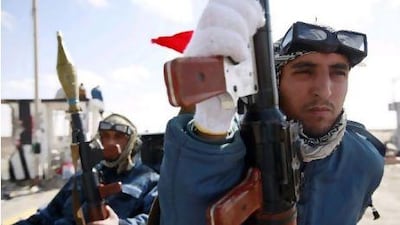WASHINGTON // As Libyan forces loyal to Col Muammar Qaddafi adapt to the conditions imposed by the Nato no-fly zone, Western powers have reportedly already moved to bolster opposition forces more directly on the ground.
Barack Obama, the US president, is reported to have signed a secret presidential order to supply the Libyan opposition with arms and training weeks ago. Central Intelligence Agency operatives, meanwhile, are widely understood to be on the ground already, supplying intelligence to Nato air forces and getting a sense of the opposition forces.
The White House has acknowledged neither of these claims. A spokesman on Wednesday said the administration would not comment on intelligence operations. As for supplying arms to the opposition, Jay Carney, the spokesman, in a statement said:" We're not ruling it out or ruling it in."
But supplying arms and training to ragtag opposition forces that have proven unable to press an offensive against better-equipped government forces would be a next logical step for a Western strategy that aims to see the end of Col Qaddafi's rule, but wants to accomplish this without deploying troops on the ground.
In recent days, reports out of Libya suggest that Col Qaddafi's forces have changed tactics in response to the new conditions imposed by Nato planes patrolling the skies of Libya. The country's largely desert conditions made it easy for Nato forces to identify and destroy heavy armour from the air, but the Libyan army is adapting, now moving troops in civilian lorries rather than military vehicles to avoid targeting.
Moreover, the efficacy of air power is limited once applied to other than open terrain. It would be hard, in the absence of an effective opposition force, to push Col Qaddafi's forces out of towns and cities without also having eyes on the ground.
Nathan Hughes, director of military analysis at Stratfor, a Texas-based global intelligence company, said: "You try to protect the far east of the country, Benghazi and Tubruk, with air power, and that's within its scope. But it doesn't do you any good in terms of the cities in the west, and you can't bring Qaddafi down with air power."
UN Security Council Resolution 1973, which provided for the no-fly zone, does not sanction the deployment of troops on the ground. And Washington is extremely careful not to be seen to be straying beyond the confines of the UN mandate for fear that the international coalition that has been assembled to enforce the no-fly zone would crumble.
The concern in Washington is that Arab countries in particular would withdraw their support for the international military operation if it should come to resemble an all-out occupation. Moreover, the administration is just as wary of being caught up in another Iraq scenario.
The debate over what further military action should be taken came as Qatar's emir said the West intervened in Libya after the Arab League failed to live up to its duty to protect civilians, AFP reported.
"The suffering of civilians in Libya led the international community to intervene because of the inaction of the Arab League which was supposed to assume the role," Sheikh Hamad bin Khalifa al Thani told Al Jazeera television yesterday. Qatar has joined the air strikes on Col Qaddafi's forces.
Senior US officials, including Hillary Clinton, the secretary of state, have increasingly in recent days argued that the UN resolution's wording to "take all necessary measures" to protect civilians in Libya, does open the door for arming the Libyan opposition.
At a conference earlier this week, Mrs Clinton said it was the US view that Resolution 1973 "amended or overrode" the arms embargo called for in an earlier UN resolution 1970 and that "there could be legitimate transfer of arms if a country were to choose to do that."
There has certainly been pressure on the US administration to take its efforts in Libya a step further. Analysts and commentators have argued that a status quo, in which the Libyan opposition is in charge of the east and Col Qaddafi of the west of the country, could be open-ended.
The lessons of the Iraq sanctions, which were imposed in 1990 and only effectively ended with the US invasion in 2003 (and were only formally lifted in 2010), have loomed large. The sanctions on Iraq arguably hurt civilians more than the regime against which they were targeted, and did nothing to weaken the regime of Saddam Hussein vis-à-vis any domestic opposition.
Steven Clemons, senior fellow with the Washington-based New America Foundation, said a no-fly zone alone is insufficient to substantially change the military equation: "A status quo is to Qaddafi's advantage."
Arming opposition forces would be one way to change the balance of power in Libya. But it carries with it its own risks and could also take time.
Mr Hughes said unlike in Afghanistan, where the Northern Alliance was an established and battle-hardened militia, it is not clear that the opposition in Libya is able to present any "meaningful" military force.
It is thus not clear, he argued, that supplying arms to the opposition would achieve anything: "It's not necessarily just a question of arms, it's question of unity, of fighting strength, of command and control."
But the true abilities of the opposition are not known and CIA operations on the ground are likely to be as much about gathering intelligence about the opposition as Col Qaddafi. A former CIA officer, who declined to be identified, said the US had long given up traditional intelligence gathering in Libya and the region generally, and was therefore now playing catch-up.
"Our intelligence efforts throughout the region have in the past decade become focused almost solely on counter-terrorism. As a consequence, we have no real idea about the domestic politics of Libya or, indeed, any other country in the region."
]

